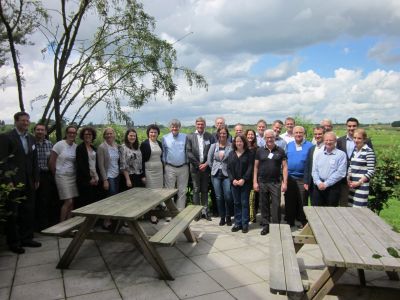Myotonic Dystrophy – Developing a European Consortium for Care and Therapy
- Number 222
- Date 1 July 2016
Organizers: Hanns Lochmüller, Baziel van Engelen, Benedikt Schoser, Guillaume Bassez

Description of the workshop
Myotonic dystrophy is a rare disorder, characterised by enormous genetic and clinical variability. This makes clinical testing of therapeutic approaches more challenging and warrants close international collaboration between expert centres in Europe. To ensure clinical trials to be conducted, sharing of existing, partly unpublished natural history data, refinement of suitable outcome measures, identification of patient populations, and qualification of trial sites is required. Moreover, networking of the existing knowledge, infrastructure and personnel will facilitate appropriate inclusion and communication of patients and patient organisation, the interaction with commercial as well as academic trial sponsors, and the involvement of regulators and payers along the translational pathway.
The aim of the workshop
- Found a European DM Consortium
- Increase collaboration
- Build upon work already carried out by others, e.g. share natural history data
- Harmonise procedures (e.g. outcomes, registries)
- Create a trial network and define rules of engagement.
Participants shared their expertise in research on a range of clinically meaningful endpoints. The limited knowledge of endpoints that can be used to make decisions in clinical trials is one of the most significant barriers to drug discovery and development in Myotonic Dystrophy type1. The workshop was dedicated to address this key gap by taking advantage of expertise from patient representatives, academic scientists, company drug developers, and European regulatory authorities.
The consensus from the workshop was to meet this need through the establishment of a European Consortium that would share the diversity of expertise and patient data to inform clinical trial design and patient treatment paradigms through a standardised core data set.
The following key deliverables were achieved:
- Establishment of standardised operating procedures for endpoint measures that are critical to natural history studies and clinical trials.
- Harmonisation of disease classification.
- Commitment to more open sharing of data and samples together with lessons learned across the Myotonic Dystrophy type 1 community
- Agreement on a mechanism for members to come together into an effective consortium to address these key issues in Myotonic Dystrophy type 1
- Agreement to work in partnership with the USA and Canada
Road map for the future
Findings from the Optimistic trial will be published during 2017 and this will provide not only extensive natural history information but also a proven framework for future trials. The nature and findings from the trial in addition to being a study in its own right can be used as building blocks to design and input into future trials together with aiding interpretation of results. The Community is now significantly better prepared to enter into and interpret clinical trials and there is an impetus to further develop along these lines.
The members of the Steering Group for the Consortium have been appointed and progress will be reviewed within six months of this meeting. A full report is published in Neuromuscular Disorders (pdf).
Participants:
Baziel van Engelen, (Radboud University Medical Centre, The Netherlands), Hanns Lochmüller (University of Newcastle, UK), Benedikt Schoser (Ludwig/Maximilians University, Germany), Guillaume Bassez (Créteil University Hospital, France), Jeannette Charlton (representative of Muscular Dystrophy, UK), Alain Geille (AFM Telethon representative, France), Shaun Treweek (University of Aberdeen, UK), Antonio Atalaia (University of Newcastle, UK), Libby Wood (University of Newcastle, UK), Rachel Thompson (University of Newcastle, UK), Giovanni Meola (University of Milan, Italy), Christopher Lindberg (Sahlgrenska University Hospital, Sweden), Vidosava Stojanović (Clinical Center of Serbia, Serbia), Marie Kierkegaard (Karolinska University Hospital, Sweden), Cornelia Kornblum (University Hospital Bonn, Germany), Darren Monckton (University of Glasgow, UK), Cynthia Gagnon (Clinique des Malades neuromusculaires, Canada), Chad Heatwole (University of Rochester, USA), Valeria Sansone (University of Milan, Italy), Matthias Boentert (University Hospital Munster, Germany), John Vissing (Rigshospitalet, Denmark), Arend Heerschap (Radboud University Medical Centre,The Netherlands), John Porter (MDF representative, USA), Pavel Balabanov (EMA representative, UK), Laury Mignon (IONIS Pharmaceuticals, USA).
